Girls’ voices from a fast-growing refugee camp
Girls who have fled violence in Sudan explain how life has changed since living in a refugee camp in Chad, including the impact of having safe spaces to learn, socialise and play.
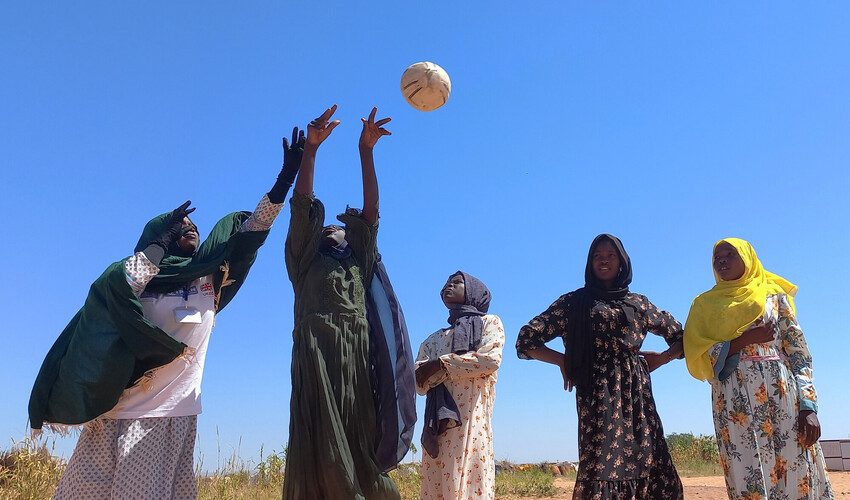
Girls play volleyball at mobile child protection unit in Adre camp. All photos ©Plan International.
On the border between Chad and Sudan, the desert town of Adre has become one of the main routes for people fleeing the ongoing conflict in Sudan’s Darfur region. With nowhere else to go, thousands of families now live in one of the world’s fastest growing refugee camps on Chad’s eastern border.
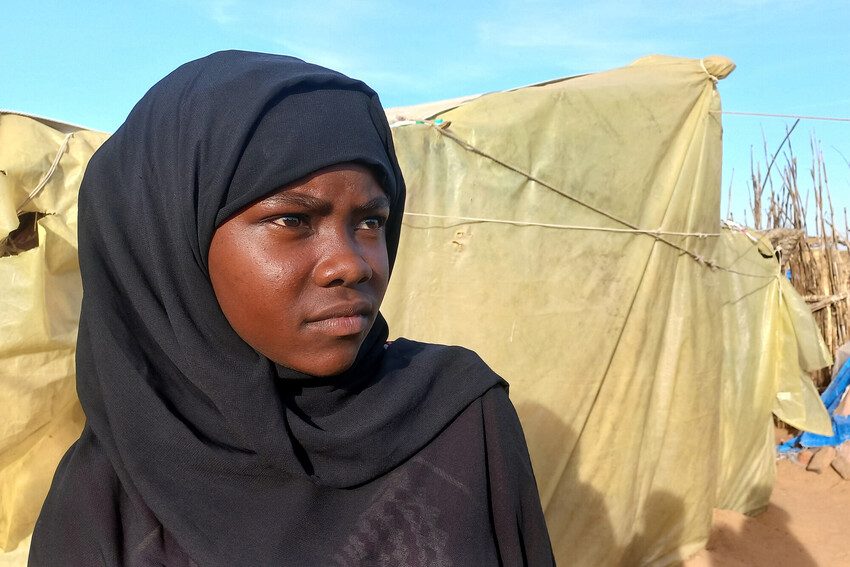
Fatima, 15, left Darfur in June 2023 to escape the violence. “Things are very bad there. It was very difficult to stay in our country because of the fighting. We could not see peace there. We lost hope,” she says.
Fatima and her family fled their home but were stopped on the road by armed men who thought her father was in a position of authority. “I don’t know why they thought that about my father. The man asked my dad to get out of the car, we were so scared. They said you cannot leave here, you are our target.”
Fortunately, their driver negotiated with the men and they eventually let the family pass. “Luckily we were all safe. But we had heard that many people were killed on the way. I don’t know how many were killed, but we were lucky. Some of our relatives and family members are still out of contact.”
Struggles for refugees in Chad
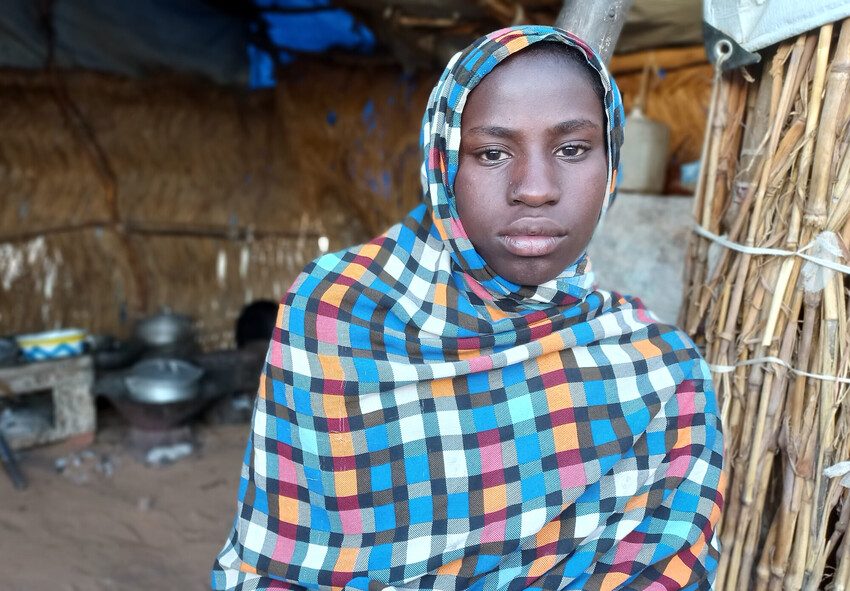
Chad, one of the world’s poorest countries, has borne the brunt of the crisis, hosting more than 710,000 Sudanese refugees, more than 60% of whom are children. Adre was originally home to 40,000 people, but the population has increased sixfold due to the influx of refugees. The refugee camp is currently home to around 237,000 people and more arrive daily.
Mehad, 16, fled Sudan last year and she says there are many challenges in the camp. “We don’t have much food, there’s not enough for us to eat. It is difficult to get water, there is not enough for everyone to stay clean and wash themselves. We get less aid and when we do get something, it is less than before and not enough for us to live on.”
After finding work in the local market, Mehad earns around 1000 FCA (less than €2) a day, which she uses to buy food and pay for other necessities. “I learned how to sell from my neighbour. When I work, we can buy food. I buy food in the market and sell it in the market. I have never done this kind of work before, but I need money to survive here.”
Managing periods difficult for girls
Chad’s infrastructure is overstretched and there is a severe lack of basic services in the camp. The lack of clean water, latrines and cleaning materials means that disease spreads quickly. “Some of the girls are in poor health. They suffer most when they are menstruating. They don’t have sanitary towels. There is not enough water for washing and showering,” explains Fatima.
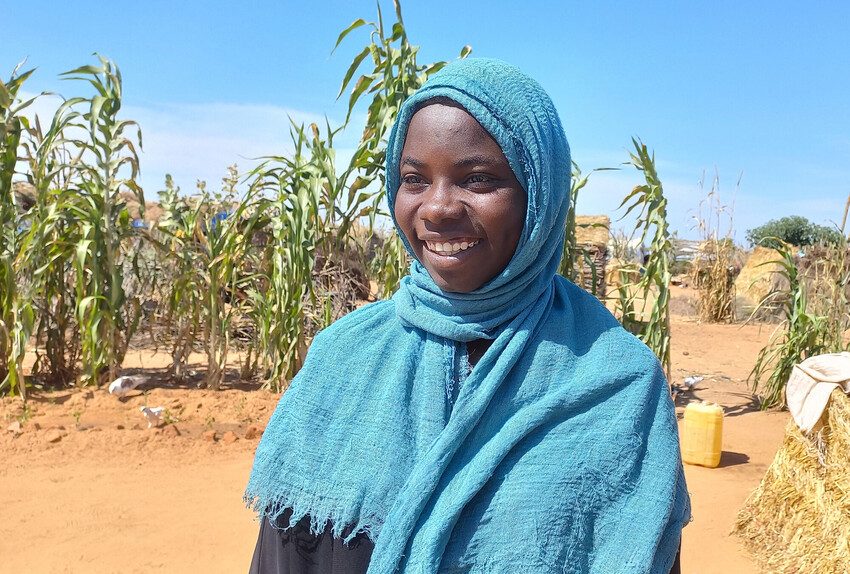
Hanady, 17, came to Adre a year ago. “It is really difficult to manage my period. We don’t have enough water to wash and stay clean. I depend on my brother, when he gets work in the market he buys me some pads, otherwise I have nothing.
“I don’t know anyone here. I need things like sanitary towels, medicine and hygiene kits. There is not enough water for us to use and the toilets are not good. I don’t do anything here except pray, cook food and meet friends, that’s how I spend my time. I want to go to school, it is the only way to improve our lives.”
Children living in the camp have no access to formal education. The cost of schooling and the lack of trained teachers are barriers that undermine their right to a quality education. “I’m worried that I won’t be able to finish my studies, that the situation will get worse and more difficult. If we could get a good education here, our lives would be better,” says Fatima.
Hanady is also worried about her future. “We had a comfortable life in Sudan, I went to school, took showers and learnt languages and computer skills. Life was good in Sudan, but the war separated us from our family and left us without work or education. I miss my school; this will put me in a difficult situation for my future.”
Safe spaces for play and learning
Plan International has been responding to the refugee crisis in Chad since May 2023, with an office in Adre focusing on education and child protection in emergencies. Our mobile child protection units provide safe places for children to learn. The units offer essential protection services, including psychological first aid, recreational activities and socialisation.
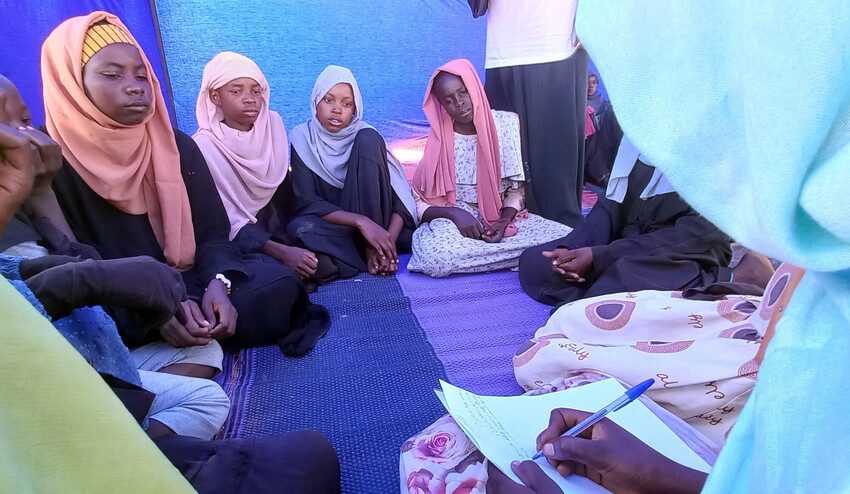
For Mehad, attending the unit for a few hours each week has lifted her spirits and boosted her confidence. “I can meet my friends at the centre. I get advice from them and share it with others I meet. I like the classes and playing volleyball, it helps to be with my friends. I like going to the afternoon sessions. I used to go to school regularly in Sudan. I miss that here. But I learn new things in the classes, like how to communicate with other people, friendship and making connections.”
The child protection unit organises recreational programmes for all age groups in the mornings, followed by life skills sessions in the afternoons. The teams running the units are all Sudanese refugees trained by Plan International in child protection services. The team also distributes dignity kits to adolescent girls and raises awareness of menstrual health among the refugee population.
Most of the girls we spoke to want peace for Sudan and to be able to return to their homes. “I hope there will be peace and we can go back home, but I am worried that it will be too late for us. This war may not stop because they do not think of humanity. But it must stop. For me, peace means security, a good life and school,” says Hanady. “Peace means a lot to me. We need peace to live in safety, to rebuild our country and we want things to return to normal. We want to live happily and go back to Sudan. Peace is a beautiful thing, we can live together without discrimination and rebuild our country,” concludes Fatima.
Categories: Emergencies


